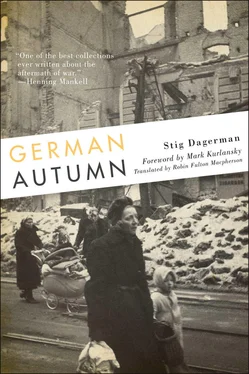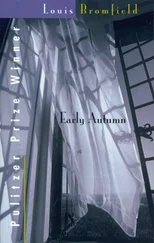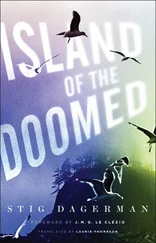But by the time the apple has come to an end, apathy has coiled round us. We hang like dead bodies against one another, lean against unknown shoulders and go numb in this suffocating box stinking of sweat and bad air. To keep themselves awake until they change trains the three POWs talk together quietly but with barely restrained vehemence about a cake, a huge and glorious French gateau one of them had eaten in Paris during the occupation. He tries to recall this cake, how deep the layer of cream was, whether it was cognac or arak in that hole in the middle, whether he ate it with a spoon or with a knife or with both.
Towards the end of the night the train stops in a big, empty, brightly illuminated station. There is not one sound to be heard and not one person to be seen. It is like a dream. But suddenly a booming echo reverberates between the station walls: an order is being thrown at us from a loudspeaker. Passkontrolle. Gepäckkontrolle. Passport check. Baggage check. The passengers must leave the train, taking their luggage with them. When we have waited for a time on this platform in Eichenberg, a station on the frontier between German England and German America, a few tall American soldiers come along. They chew gum and walk about kicking luggage and examining Ausweise. Gerhard is nervous, he has tampered with his passport, contrived to designate himself ‘agricultural worker’ instead of mechanic in order to cheat the Russians, but all goes well.
From here to Hannover we now stand by a window and talk about his life. He says he is glad that the war went the way it did; he no longer has to go out marching with the Hitler Jugend every Sunday, but nevertheless he says that his service in the war was prima, ganz prima. He was a mechanic stationed at an airfield in Holland and he claims he will never forget his days there. But now he wants to get away; ‘You can’t stay in Germany if you’re young.’
Before daylight has properly come we watch some dramatic episodes at various stations where we pause. The train is still just as packed as it was, but at those stations there are waiting crowds of despairing people who have as much right to travel as we have. A desperate woman runs along the train and outside every compartment she screams that she must reach a deathbed, but not even someone trying to reach a deathbed can find a place on this train if she lacks the strength to force her way on. A great, rough fellow pushes into our compartment and exchanges blows with a man already standing in the doorway, and since he is a better boxer he thus gets a place on the train. It is the only way.
After Hannover, when many have left the train, there are people standing along the line with full potato-sacks. They drag their sacks over the feet of those who are standing and they smell of earth and autumn. When they heave their sacks up on the luggage racks earth dribbles out over the heads of those sitting beneath. They dry the sweat from their foreheads, both women and men, and they tell us about a tragedy, a potato tragedy, that has just happened.
A woman from Hamburg, who had travelled to Celle with four empty sacks and a handcart and who after four days of relentless effort had managed to fill those sacks through begging from the farmers around Celle, had then by mustering all her strength succeeded in dragging her sacks to the station. When she arrived there her face was glowing with satisfaction. She dried the sweat from her brow, which was then smeared with good earth instead. She had managed. She had done what few others had the ability or the perseverence to do: she had managed to scrape together a whole winter’s supply of potatoes for her hungry family. So she stands there in the station at Celle and is pleased with herself and her four days and thinks of the joy that will radiate towards her when she arrives home. She does not yet know that she is a Sisyphus who has rolled her stone up to the hilltop; soon it will tip over and vanish far below. True, she has her sacks and her cart and her strong hands, but her chances of getting into a train are nil. With four potato-sacks no one gets on to a German train. With two perhaps if one can fight. She stands all day waiting for the empty train, the one that will have space for all of her fortune, but such a train does not come, and those with experience tell her that such a train will not come any other day either, such a train will never come at all. She becomes more and more desperate. She must get home at any price; she has already been absent much too long and one cannot walk all the way from Celle to Hamburg. She is now somewhere or other on this train, a bitter and hopelessly tired old woman with one sack of potatoes on the luggage-rack and the other three and a precious handcart in the station at Celle.
The compartment is full of potatoes, the air smells raw and autumnal and everywhere the train stops there are crowds wanting to get on. Someone squeezes in and tells us that now people are sitting on the buffers. Soon we hear the stamping of cold feet above us, so now people are travelling on the roof. It becomes insufferably hot in the compartment. I share my dry sandwiches with Gerhard. Someone pulls the window down and a small hand appears from somewhere outside and grasps the edge of the window, as in a surrealistic film. A boy in front of me questions the reality of that hand, but another boy bets him an Allied cigarette that it is a proper hand. The doubter reaches out his own hand and strokes the unreal one, squeezes it, and it is indeed a real hand. A woman is crouching on the footboard, clinging to the top of the window-pane.
As we cross Lüneburg Heath the first snow of autumn falls and those who clamber down from the roof and in from the buffers and beg to be allowed in are white as cotton. The light fades and some black-marketeers in the compartment exchange cigars and confidences with refined gestures. As we approach Hamburg Gerhard becomes uneasy. His belief in America has now evaporated. America was something he could believe in when Hamburg was twenty-four hours away. He knows there are no boats but he has not yet told himself. Can’t he come with me to Sweden? There is nothing I can say to that. All I can do is stare up at the muddy potato-sacks, keep silent and suffer a bad conscience.
We come into Hamburg almost four hours late or, as it is called in the language of inflation, two hundred and thirty minutes. It is cold and windy and it is snowing. The snow is falling on the ruins and on the dirty piles of bricks and on the girls from the Reeperbahn who are hungry for food but not for love. The snow is falling on the sluggish canals where sunk barges lie at rest under a roof of greasy oil. We walk for a while in the cold, Gerhard and I. Then we have to part outside the hotel with the sign NO GERMAN CIVILIANS. I shall go through the swing-door and enter a dining-room with glasses and white tablecloths and a gallery where in the evening musicians play from the Tales of Hoffmann. I shall sleep in a soft bed in a warm room with hot and cold running water. But Gerhard Blume walks on, out in Hamburg’s night. He does not even go to the harbour. And nothing can be done about that. Absolutely nothing.
What is the distance between literature and suffering? Does it depend on the nature of the suffering, on its closeness or on its strength? Is the distance less between poetry and the suffering caused by the reflection of the fire than the distance between poetry and the suffering arising from the fire itself? There are examples to hand that show there is a more or less immediate connection between poetry and remote or closed suffering. Perhaps we can say that simply to suffer with others is a form of poetry, which feels a powerful longing for words. Immediate open suffering distinguishes itself from the indirect kind by, among other things, not longing for words, at least not at the moment it occurs. Open suffering is shy, restrained, taciturn.
Читать дальше












